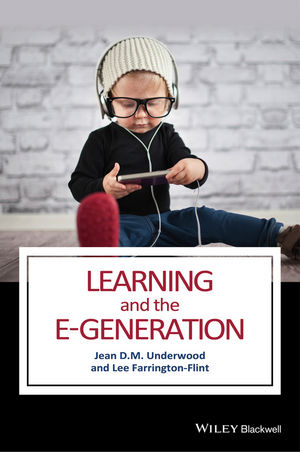
Learning and the E–Generation
John Wiley & Sons Inc (Verlag)
978-1-118-89759-1 (ISBN)
Learning and the E-Generation examines the impact of new
and emerging digital technologies?from computers and tablets
to social media and video games?on learners in formal and
informal settings.
Assesses the psychological factors at play, including social,
cognitive, and behavioral characteristics that are influenced by
exposure to technology
Addresses the risks and benefits of 21st century
digital technology on children and young adults
Written by two experts in the field who draw on the latest
research and practice from psychology, neuroscience, and
education
Discusses the potential of technology to make the learning
process more authentic and engaging, as well as the obstacles which
can prevent this from happening effectively
Jean D. M. Underwood is Professor Emeritus of Psychology at Nottingham Trent University, UK. She has published extensively on the effects of technology identifying the cognitive and social factors that facilitate and inhibit effective learning with and through digital technologies. She is the co-editor of several books, including Learning Through Digital Technologies (2007) and Integrated Learning Systems: Potential into Practice (1997). Lee Farrington-Flint is Lecturer in Developmental Psychology at the Centre for Research in Education & Educational Technology at The Open University, UK. He has published on the topic of early language and literacy skills and early arithmetic development, and the role of digital technology on children?s communication and learning. His work has appeared in the Journal of Research in Reading, British Journal of Developmental Psychology, and Educational Psychology, among other top journals.
Foreword ix
1 Learning in a Digital World 1
Starting points 1
Hopes, dreams and nightmares 4
Why Is the Supportive Evidence so Hard to Find? 5
How does psychological Theory Illuminate the Educational Debate?
11
How Can We Bridge the Home School Digital Divide? 15
Risks, skills and opportunities 16
Conclusions 16
2 How do People Learn? 18
Introduction 18
What is learning? 19
Beyond General Theories of learning 22
What About the Quality of Learning? 23
Active Versus Passive Learning 24
Preferred Learning Styles 26
What About the Learner? 28
Risks, Skills and opportunities 30
Conclusions 30
3 Social Interactions and Written Communication 32
Introduction 32
Communicating Online 33
Changes in Written Language 36
Abbreviations Mediated Through Technology 39
The Effects of Text Abbreviations on Literacy Skills 41
Risks, skills and opportunities 44
Conclusions 44
4 E-Books, E-Readers and Tablets, Are they the Way Forward?
46
Introduction 46
E-books: Are they Effective Teaching Tools or an adjunct to Real
Reading Activities? 47
Promoting Collaboration and Peer-group interactions 51
Adult instruction is Still Important 53
The benefits of Kindles and iPads 55
Mobile technology and Second Language Learning 58
What About Those at Risk of Reading Difficulties? 59
A Multisensory Experience 61
Risks, skills and opportunities 64
Conclusions 64
5 Becoming Digitally Literate 66
Introduction 66
Engaging with New Forms of literacy 67
So Which Literacy Skills are required to become a Digital
Native? 68
The Multimodal Landscape 70
Visual Literacy and Visual Representations 71
How Can Visual Representations Support Learning? 73
Risks, skills and opportunities 76
Conclusions 77
6 Social Networking as an Educational Tool 78
Introduction 78
Facebook as a Popular Networking Tool 79
Social Capital 80
Social Networking in Educational Contexts 82
So why is the Educational use of an SNS different from Using a
Virtual Learning Environment (VLE)? 86
Where Does This Leave Us? 87
The Need to Establish Rules of the Game: Netiquette 88
Risks, Skills and Opportunities 89
Conclusions 90
7 Absorbed by Technology 92
Introduction 92
Addiction and Wellbeing 93
Time Wasting 96
Driven by the Fear of Missing Out (FOMO) 97
The Interplay of Cognition and Internet Activity 98
Are Multitaskers Always at a Disadvantage? 102
Going with the Flow 103
So what are Young People Learning? 104
Risks, Skills and Opportunities 105
Conclusions 105
8 Games, Learning and Education 107
Introduction 107
The Nature of Games 108
Simply Addicted to Games? 109
Games and Learning 112
Is Gaming a Panacea for Educational Ills? 116
The Future of Games for Learning 120
Risks, Skills and Opportunities 122
Conclusions 122
9 Misbehaviour or Merely Misunderstanding? 124
Introduction 124
What is Academic Dishonesty? 125
Prevalence rates of Academic Malpractice 126
Why do Students Take the Risk? 128
Do they Know what they are Doing? 130
And the Solution is? 132
Risks, Skills and Opportunities 134
Conclusions 134
10 Being Emotionally Intelligent and Risk Resilient
136
Introduction 136
Shades of Light and Dark 137
Overcoming Risks and Building Resilience 139
Self-disclosure and Social Networking 142
So are Emotional Intelligence and Resilience the Key to Reducing
Risk? 144
How do We Cultivate a State of Emotional Intelligence and Risk
Resilience? 147
Risks, Skills and Opportunities 149
Conclusions 150
11 The Future of Learning 151
Introduction 151
The Skills of the Net Generation 152
Bridging the Home?School Divide 156
Can Psychological Theory Inform Educational Practice? 158
Promoting Educational Change 160
Learner, Teacher and School Level Characteristics 161
Many Possibilities but No Certainties 165
References 167
Author Index 202
Subject Index 214
| Verlagsort | New York |
|---|---|
| Sprache | englisch |
| Maße | 155 x 237 mm |
| Gewicht | 436 g |
| Themenwelt | Geisteswissenschaften ► Psychologie ► Entwicklungspsychologie |
| Geisteswissenschaften ► Psychologie ► Pädagogische Psychologie | |
| Sozialwissenschaften ► Pädagogik | |
| ISBN-10 | 1-118-89759-5 / 1118897595 |
| ISBN-13 | 978-1-118-89759-1 / 9781118897591 |
| Zustand | Neuware |
| Informationen gemäß Produktsicherheitsverordnung (GPSR) | |
| Haben Sie eine Frage zum Produkt? |
aus dem Bereich


